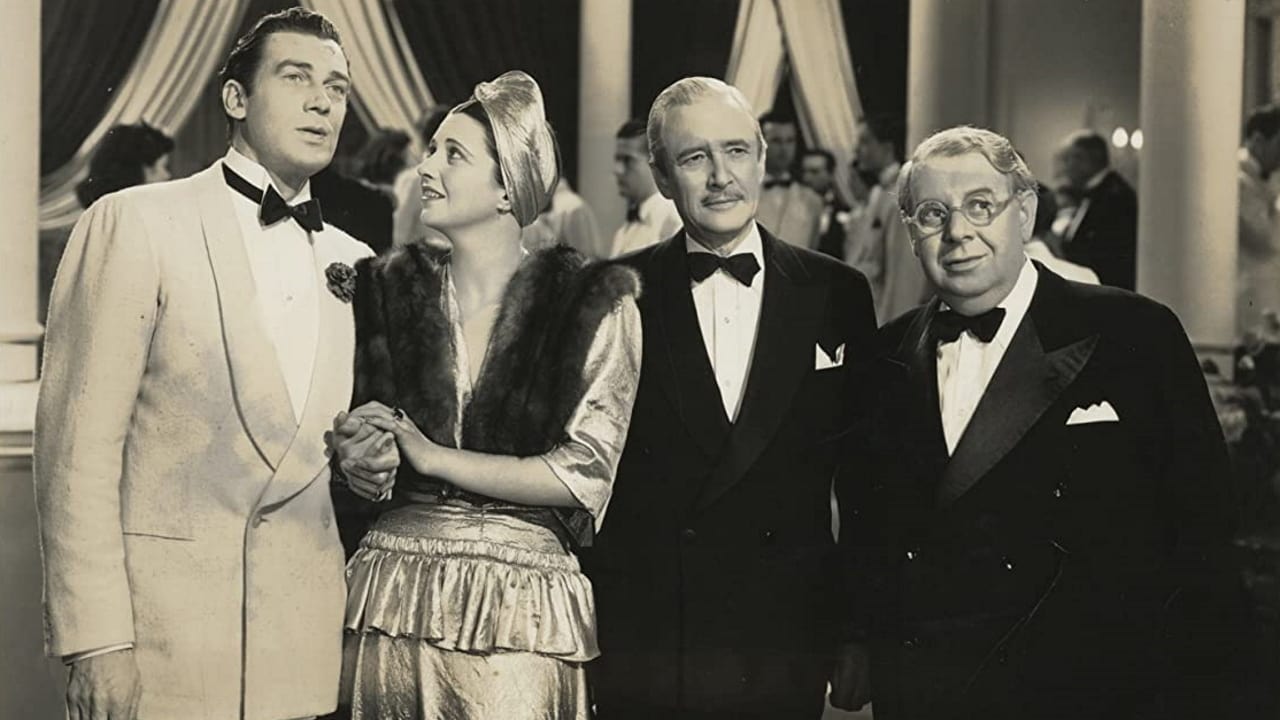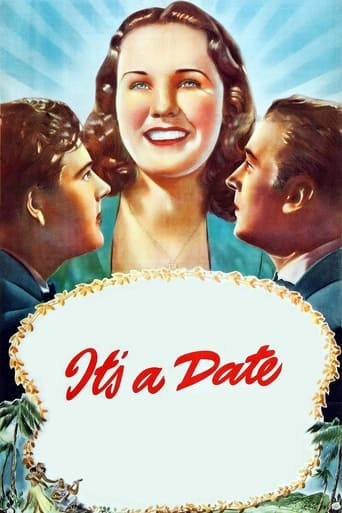

It's entirely possible that sending the audience out feeling lousy was intentional
... View MoreI wanted to like it more than I actually did... But much of the humor totally escaped me and I walked out only mildly impressed.
... View MoreA movie that not only functions as a solid scarefest but a razor-sharp satire.
... View MoreExactly the movie you think it is, but not the movie you want it to be.
... View MoreI only wanted to DVR and watch It's a Date because Cissy Loftus was in it. Cecilia "Cissy" Loftus was born in Scotland in 1876, and was a great star of music halls, vaudeville plus stages of London and Broadway. This was all before World War One. She was London's second Peter Pan in 1905 (you already know that I love everything Peter Pan). Cissy got married and had a child, and later a very painful divorce, and I imagine because of that and World War One her theatrical prospects may have all but dimmed out. She became alcoholic and drug-dependent, poor thing. This is all true. I still love her very much. As a theatrical and film historian, I have researched and seen pictures of her as a very young woman, and I think that she is very beautiful, both inside and out. She appeared in all kinds of plays and shows, plus silent films. Cissy made some sound films, including some near the end of her life, such as both 1940's It's a Date and The Blue Bird. She only made three films after these two, then passed away quite soon in 1943, of a heart attack from the effects of alcoholism and other drug use. My research says that she died in poverty, with friends paying her final expenses. Was she desperate for money when she made It's a Date? She was no longer an ingenue or a star, and her role in this film was as a wise, old granny/maid character who knitted in the background. Maybe she wanted Walter Pidgeon for herself, but she knew that character parts don't get hooked up with leading men. She was only about 64 when she made this film, but looked made up to be around 84, lol. Deanna: a better voice (beautiful high soprano) than Judy G. Prettier than Judy G., but IMO D. got thrown under the bus in order for Judy's career to flourish. IMO same for Shirley T. In all three cases, their careers fizzled out sooner or later. I also feel that the proverbial casting couch became the place to make or break their futures, and that some succumbed to it while others refused. I am speaking in code here (can you spell Hays Code?). You get my drift. Refuse, and your career is over. I loved all of Deanna's songs here. Yes, IMO her voice was so divine. Great to see all of her supporting cast. 10/10
... View MoreWith my dad having picked up a DVD boxset titled "The Complete Deanna Durbin Collection" a few months ago,I decided to take a look on Durbin's IMDb page,to too the reaction that her films have received.Taking a look at Deanna's page,I was amazed to discover that she appeared to be credited for more titles then what was contained in the set.Taking my time to look down the list,due to wanting to make sure that I had not made a mistake,I was shocked to discover that the "complete" boxset had actually left out 2 of Durbin's feature film titles.Franticly searching round for one of the 2 titles,in the hope of being able to pick at least 1 of them up in time for my dad to receive it as a Christmas present,I sadly found myself almost giving up,due to the only edition that I could find for one of Durbin's "left out" titles (It's A Date),being a very expensive Video.Deciding to take one last shot at tracking it down,I decided to E-Mail a DVD seller about the title,who ended happily catching me by surprise,by revealing that she had actually just recently tracked down the movie,which led to me excitingly getting ready to go on a date with Deanna Durbin.The plot:Prepairing to stage their next play,theatre director Sidney Simpson and writer Carl Ober decide to offer the main role to leading actress Georgia Drake,after witnessing Georgia deliver a stunning performance in her latest production.Taking advantage of Simpson and Ober's full attention being currently on her mum,Pamela Drake decides to invite both of them to see her current stage production,in the hope that they will be able to help her get on to bigger and better things.Attending the play half-heartedly,Sidney and Carl soon find themselves left completely speechless,after Pamela delivers a breathtakingly elegant performance.Feeling that she would be a much better fit for the lead role than her mum (a casting decision that Pamela does not know about),Ober and Simpson decide to offer Pamela the lead role.Astonished to get such an offer,Drake gladly accepts their invitation.Heading out to visit her mother on a sea crew,Pamela finds herself falling for a fellow passenger called John Arlen,who joins Drake in her visit to her mother.Getting set to give her mum the great surprise news,Pamela soon discovers that her mum appears to think that she herself has the lead role,which Pamela has been recently cast in.View on the film:For the first half of the film,the screenplay by Norman Krasna,Jane Hall,Frederick Kohner and Ralph Block take a delightfully gentle,satirical shot at the stage and acting world,with the writers setting the movie in a world where everyone's fragile ego is desperate for their "big break",whilst director William A. Seiter joins in the fun by superbly showing moments that initially look to be intimate,to in fact be scenes from auditions.After Pamela Drake is joined by John Arlen and her mum,the writers sadly allow the satirical side to fade away,to instead be replaced by a family Drama focus,which despite containing a surprisingly open ending,does lead to the film losing some of its charm and sparkle.Despite only being 19 at the time,Deanna Durbin gives an excellent performance as Pamela Drake,with Durbin showing that she is far from one note,by not only delivering each of the songs in the movie with a full force of emotion,but also display a real sense of venerability,as Pamela starts to fear that her dreams may be harder to archive then originally expected.Joining Durbin,Kay Francis gives a terrific performance as Georgia Drake,with Francis showing Georgia to be someone who knows her time in the lime light is about to fade,but is unable to turn down the chance of reaching the main stages with a major role.
... View MoreDeanna Durbin stars in "It's a Date," a 1940 comedy also starring Kay Francis, Walter Pidgeon and S.Z. Sakall. Durbin plays Pam Drake, an aspiring young actress whose mother is a theater star, Georgia Drake. After the successful run of a play, Georgia and her maid Sara Frankenstein (Cecilia Loftus) head for Hawaii for R&R before she starts her new play. However, the author (Sakall) isn't sure she's right for the role; he thinks Georgia is too old. Ultimately he sees Pam perform and gives her the role. Not realizing her mother thinks it's hers, she takes a ship to Hawaii so her mother can help her prepare. On the ship, she meets a man (Walter Pidgeon) that she thinks is a stowaway - he's actually John Arlen, a successful businessman. Once in Hawaii, Pam finds out the truth about the role and tries to keep it from her mother; John, meanwhile, has fallen in love with Georgia, but Pam thinks she's in love with him and it's mutual. It's a mess.In Durbin's earlier films, I found her speaking voice high-pitched and a little annoying and her acting overly energetic to the point of being hyper. Here, she's delightful, bubbly without being manic, and she looks very pretty. Her singing voice has matured as well - she sings "Musetta's Waltz," "Ave Maria" and "Loch Lomond." The whole voice is richer though I will never be a fan of the way sopranos in those days were trained to back off of their high notes. She puts a little too much weight in the middle voice and therefore has a somewhat screechy Bb at the end of "Quando M'en Vo." Still, however, she is one of the best classical singers in film.Though Durbin was a huge star at Universal, the studio never bought big properties for her. This is a nice film with good performances but that's about it. Kay Francis is lovely as Georgia and Loftus is funny as Sarah. The handsome Pidgeon does his usual good job.Deanna Durbin in the end out-Garboed Greta Garbo, retiring at the age of 27 and moving to the outskirts of France, and I don't believe she's been seen since or even interviewed. The image and voice of the young girl live, and thanks to TCM, she undoubtedly has new fans. She deserves them.
... View MoreI watched this to see Kay Francis, who was coming to the end of her career here. Both she and Walter Pigeon were billed below the title; Deanna Durbin was the star, the only person billed above the title.This was the seventh movie Deanna Durbin made with producer Joe Pasternak and cameraman Joseph Valentine, and the well was running dry. This drivel would give anyone with an IQ above 70 a raging headache--even in 1940. It's a trite tale of a mother (Francis) and daughter (Durbin) in love with the same man (Pigeon) as well as mother and daughter vying for the same leading role in a Broadway play. It's nonsense with neither an ounce of plausibility nor a single bit of wit, though it fancies itself a comedy. The very contrived plot is arranged to provide Durbin with a ridiculous assortment of songs: "Musetta's Waltz" from La Boheme, Schubert's "Ave Maria," "Loch Lomond," and a bland new ballad, "Love Is All." Kay Francis was looking quite fine here, though the costume designer should have been shot for giving her unflattering turban hats.This was the first American film that S. Z. "Cuddles" Sakall appeared in, though he didn't have his nickname at that time. He was playing the sort of part here that he played throughout his Hollywood career.And the film reminded me of what an insipid actor Walter Pigeon was.
... View More